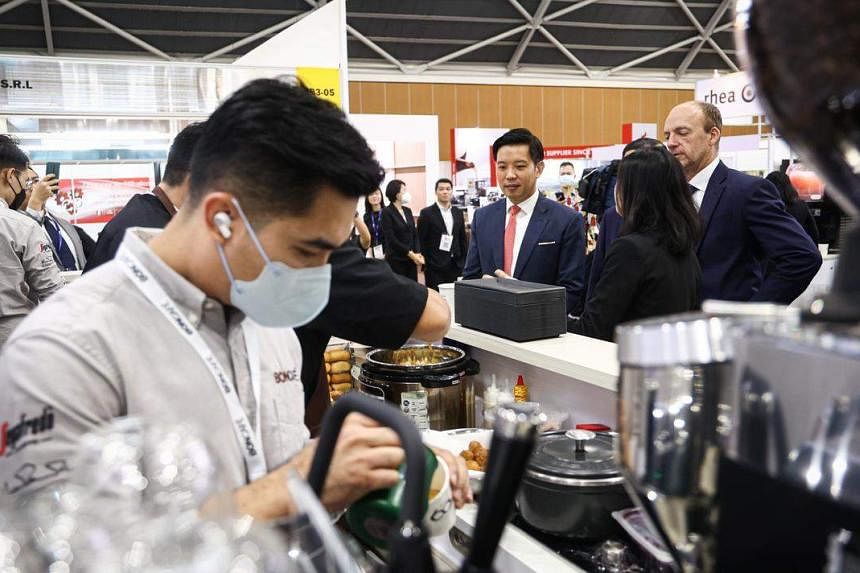SINGAPORE - Existing jobs in the hotel industry will be transformed into higher-value roles, with workers getting the necessary training for them, as well as emerging roles such as sustainability manager and digital marketing manager.
The Singapore Tourism Board (STB) will also form stronger links with schools to increase the number of local students joining the hospitality sector, while hotels can draw on support schemes to groom local staff to take on more senior roles, and to tap seniors and those with disabilities.
Such future-proofing of the industry’s workforce is one of four strategies in the refreshed Hotel Industry Transformation Map (ITM) 2025, launched on Tuesday.
The other three strategies are: capturing demand with fresh hotel concepts, sustainability as a key differentiating concept, and increasing the adoption of proven technologies.
The Hotel ITM 2025 was developed by STB in partnership with the Food, Drinks and Allied Workers Union, Singapore Hotel Association, industry players and other government agencies. It was endorsed by the Future Economy Council earlier in 2022.
The road map aims to add a real compound annual growth rate – or a measure of an investment’s average past performance over a long period – of 5.9 per cent by 2025.
Minister of State for Trade and Industry Alvin Tan said the hotel industry has made good progress since the first ITM was launched six years ago.
“Historically, our hotel industry has contributed over 20 per cent of our tourism receipts. In 2019, our hotel industry accounted for over 400 enterprises and employed more than 34,000 workers,” he said at the opening ceremony of international trade show Food & Hotel Asia-Hotel, Restaurant, Cafe at Singapore Expo.
“Our hotel industry also topped other competitor destinations in Asia in terms of average productivity from 2015 to 2019.”
The industry also reached a record average occupancy of 87 per cent in 2019. Over 1,400 workers across about 60 hotels benefited from Workforce Singapore’s Career Conversion Programme for Hotel Professionals from March 2020 to August 2022.
Mr Tan revealed that Singapore expects to reach the higher end of the forecast of four million to six million international visitor arrivals, and between $10 billion and $12 billion in tourism receipts by the year end.
While these are a fraction of pre-pandemic numbers – Singapore saw a record of about $28 billion in tourism receipts and over 19 million international visitor arrivals – they are signs the Republic is moving in the right direction, he added.

As part of the new road map, hotels are encouraged to come up with new concepts or work with partners to deliver new experiences for guests. An example is Fairmont Singapore’s Razer Gamecation, where guests can stay and play in one of the world’s first luxury e-gaming suites.
The authorities will also work with local hotel chains to expand globally, while international brands will be encouraged to set up their regional headquarters here.
In addition, hotels will be encouraged to adopt internationally recognised sustainability standards; pilot and scale sustainability solutions in the areas of energy, water, waste and carbon management; develop sustainability-centric hotel concepts; and promote sustainable consumption habits among guests.
This comes as travellers are becoming more environmentally conscious.
For example, Booking.com’s Sustainable Travel Report 2021, which gathered insights from over 29,000 travellers across 30 countries, revealed that 61 per cent of them said the pandemic has made them want to travel more sustainably.
Mr Tan said: “This is a key growth engine for businesses, a competitive advantage to enhance industry resilience, and enhances Singapore’s attractiveness as a destination.”
Hotels will also be encouraged to adopt technologies that improve their productivity and guest experiences, such as STB’s E-Visitor Authentication (EVA) system, which uses facial recognition technology to match passport images to that of guests. When integrated with a hotel’s self-check-in solution, EVA creates a fully contactless check-in experience.
Six hotels here under Millennium Hotels and Resorts rolled out such a system in January, which helped to speed up the process and enable a smoother and quicker operation for guests and staff.
Mr Andy Tan, senior vice-president of global operations and partnership at Millennium Hotels and Resorts, said the fully contactless check-in experience reduces manpower needs and assists in turning over rooms more efficiently.
“This facilitates better schedule organisation and increases staff productivity as employees now have more time to perform multiple duties,” he added.


